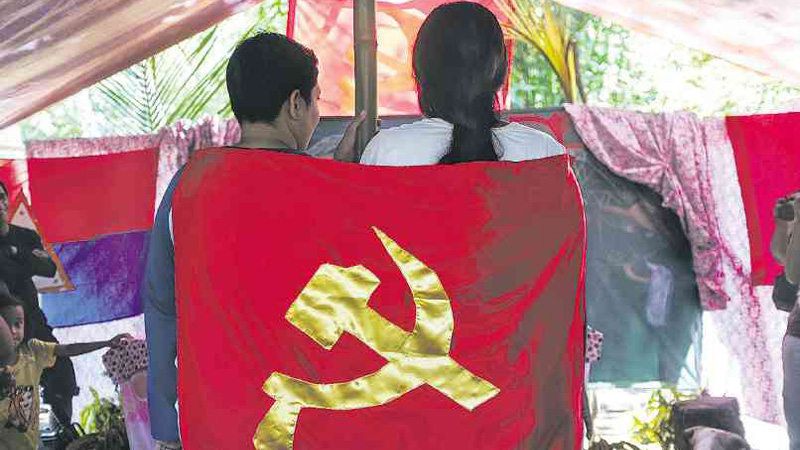Love is love in communist movement

LESBIAN WEDDING Draped with a crimson flag with a golden hammer and sickle and surrounded by heavily armed rebels, Maymay and Diane pledge their love in the first lesbian wedding ceremony administered by the Communist Party of the Philippines in Mindanao. KARLOS MANLUPIG / INQUIRER MINDANAO
DAVAO CITY—“Kiss! Kiss!” the crowd cheered, sending birds flying from their perches in a jungle somewhere in the mountains of Mindanao.
It was a liberating day, they said.
A crimson flag with the golden hammer and sickle draped over their shoulders, Maymay and Diane kissed each other in a wedding ceremony administered by the Communist Party of the Philippines (CPP).
It was the first lesbian wedding in Mindanao and it happened under the canopy of trees guarded by heavily armed guerrillas. The first such wedding was reportedly held somewhere in Metro Manila.
“Work on improving your relationship while working on enriching your commitment to the people and the revolution,” a commander of the New People’s Army (NPA), armed wing of the CPP, said during the ceremony.
Article continues after this advertisementMaymay said she first met Diane in a major political mass campaign in a big city in Mindanao. Both are in their early 30s and come from a seaside city in Mindanao.
Article continues after this advertisementSpeechless
“I was really speechless with admiration when I first saw her. Diane just had a bath that time and she had not combed her hair. I immediately fell for her,” said a giggly Maymay.
She narrated that as days passed, she became more certain that what she felt for Diane was special.
“It was not an easy process. Days passed and my feelings for her grew stronger until I was sure that I love her,” she added.
Maymay explained that she had to undergo the proper process of entering into a relationship inside the communist movement, which includes meetings and a green light from both of their collectives.
Each member of the underground movement is part of a cell or collective where relationships are also being discussed following the principle of politics over personal life.
Letter
With a shy smile, Maymay told the Inquirer that she and her group had written a letter to express her intent to court Diane and sent it to the latter’s collective.
“We sent the letter on Jan. 6 in 2014, and Diane and her collective accepted it warmly,” Maymay said.
In the country’s communist movement, it is a practice to court not just the person but also his or her collective to prove that one is worthy, not just of the affection of the person but also of the party’s approval.
A process called integration starts once the other collective agrees to accept the courtship. Both will be given time to experiment—spending time together to confirm their feelings and to attest that the blooming relationship will not affect their political responsibilities.
Sweet ‘yes’
“I kept working on courting her until I got her sweet ‘yes’ after six months,” Maymay shared.
Like all relationships, Diane and Maymay had their share of ups and downs, but these eventually led to a very special day.
A year after Maymay sent her letter for Diane, she proposed in the middle of the plaza of one of the biggest cities in Mindanao.
Everything was well prepared just like how a coordinated NPA attack was planned, they said.
“Our special friends were there. I asked some of them to sing songs while others took videos and photos. It was there where I popped the question to Diane,” Maymay narrated.
Long engagement
For those in the revolutionary movement, a year passing by after engagement is already a long engagement.
“Because of reasons beyond our control, including our political work, our wedding was delayed. We, however, used this opportunity to further refine our relationship,” Maymay said.
But the personal process, especially the preparation for the marriage, was more challenging for Diane.
“I am a Muslim. The adjustments when you enter a same-sex relationship are very difficult,” Diane said.
When she started dating Maymay, eyebrows were raised in her family and in her community.
“It was a very big struggle to make my family and village accept me for what I am,” Diane said.
Family against union
Her family, Diane said, eventually accepted her relationship with Maymay, but was still against their marriage.
“My parents knew about my wedding, but no one came except for some of my cousins who are in the NPA,” she said.
Diane stroked her long curly hair as she narrated that she had been open about the LGBT community since she was in high school.
“I was not yet sure that time about my preference, but I was very close to members of the LGBT,” Diane said.
Everything, she said, was a process.
“I had a same-sex relationship only inside the communist movement. And it is a process of opening up and acceptance,” she said.
The communist movement follows a very strict policy called On Proletarian Relationship of Sexes, which was ratified in 1998 to include same-sex relationships and marriages.
First gay NPA couple
In 2005, the first NPA gay couple—Andres and Jose—were married in southern Mindanao. They separated years later, and one of them died from sickness in the mountains.
“Our wedding is an assertion for equal love. We are all humans and we should all have the same right to choose whom to love and be a partner for life,” Diane said.
With bullets on their palms, the newlyweds did not just vow to love each other more every day but also to prove to the world that like other people, it was the same love.